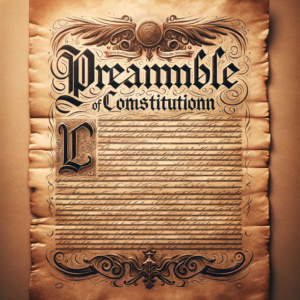Unraveling the Controversy: Landmark Free Speech Cases That Shocked America
[caption id="attachment_71154" align="alignnone" width="1075"] The Preamble[/caption]
The concept of free speech is often heralded as a cornerstone of American democracy, yet its interpretation has been the subject of intense debate and controversy throughout history. Landmark Supreme Court cases have shaped the understanding and boundaries of free expression in the United States, often reflecting the societal tensions of their times. This article explores significant cases that have tested the limits of free speech, revealing the complexities and implications of these legal battles.
Understanding Free Speech: The Constitutional Foundations of Landmark Cases
The First Amendment of the United States Constitution enshrines the right to free speech, stating, "Congress shall make no law... abridging the freedom of speech." This foundational principle has been the bedrock of numerous landmark Supreme Court cases that have defined the scope and limitations of free expression. The courts have grappled with the balance between protecting individual rights and maintaining public order, often resulting in contentious rulings that reflect the evolving values of society. These cases not only illuminate the legal framework surrounding free speech but also highlight the cultural and political climates that influence judicial decisions.
The Pentagon Papers Case: A Turning Point for Press Freedom in America
The Pentagon Papers case, formally known as New York Times Co. v. United States (1971), marked a pivotal moment in the history of press freedom in America. The Supreme Court ruled in favor of the New York Times, allowing the publication of classified documents that revealed the government's misleading actions during the Vietnam War. The Court's decision underscored the importance of a free press as a check on government power, affirming that the public has a right to know information that affects national policy. This landmark ruling not only reinforced the principle of prior restraint but also set a precedent for future cases involving the media's role in democracy, emphasizing that the press serves as a vital conduit for public discourse.
Tinker v. Des Moines: Student Rights and the Boundaries of Expression
In Tinker v. Des Moines Independent Community School District (1969), the Supreme Court addressed the rights of students to engage in symbolic speech within the educational environment. The case arose when students wore black armbands to protest the Vietnam War and were subsequently suspended by school authorities. The Court ruled that students do not "shed their constitutional rights to freedom of speech or expression at the schoolhouse gate." This landmark decision established that student expression is protected under the First Amendment, provided it does not disrupt the educational process. Tinker v. Des Moines remains a crucial reference point in discussions about student rights and the limits of expression in schools, highlighting the ongoing struggle to balance educational authority with individual freedoms.
Citizens United v. FEC: The Intersection of Money, Politics, and Free Speech
Citizens United v. Federal Election Commission (2010) significantly altered the landscape of campaign finance and free speech in America. The Supreme Court ruled that corporations and unions have the same political speech rights as individuals, allowing them to spend unlimited amounts of money on political campaigns. This controversial decision sparked widespread debate over the influence of money in politics and the implications for democratic processes. Critics argue that the ruling undermines the integrity of elections by enabling wealthy entities to exert disproportionate influence, while supporters contend that it protects free speech rights. Citizens United continues to be a focal point in discussions about the intersection of free speech, political expression, and the role of money in democracy.
Snyder v. Phelps: Balancing Hate Speech and First Amendment Protections
Snyder v. Phelps (2011) presented the Supreme Court with the challenging task of balancing the protection of free speech against the potential harm caused by hate speech. The case involved the Westboro Baptist Church, known for its inflammatory protests at military funerals, which claimed that their actions were protected under the First Amendment. The Court ruled in favor of the church, emphasizing that their speech, however offensive, was entitled to protection because it addressed matters of public concern. This landmark decision underscored the complexities of free speech jurisprudence, illustrating the tension between protecting individual rights and addressing the emotional toll of hate speech on targeted communities. Snyder v. Phelps remains a critical case in discussions about the limits of free expression and the responsibilities that accompany it.
The Ongoing Debate: Implications of Landmark Cases on Modern Free Speech Issues
The implications of these landmark cases continue to resonate in contemporary discussions about free speech in America. As society grapples with issues such as online hate speech, misinformation, and the role of social media platforms, the principles established in these cases serve as a foundation for ongoing legal and ethical debates. The tension between protecting free expression and addressing harmful speech remains a contentious issue, with advocates on both sides arguing for their interpretations of the First Amendment. As new challenges arise in an increasingly digital and polarized world, the legacy of these landmark cases will undoubtedly shape the future of free speech in America, prompting a reevaluation of the boundaries of expression in the 21st century.
The exploration of landmark free speech cases reveals the intricate balance between individual rights and societal responsibilities. As America continues to navigate the complexities of free expression, the lessons learned from these pivotal rulings will remain essential in guiding the ongoing discourse surrounding free speech and its implications for democracy. The evolving nature of communication in the digital age further complicates this landscape, necessitating a continued examination of how best to uphold the principles of free speech while addressing the challenges of modern society.
